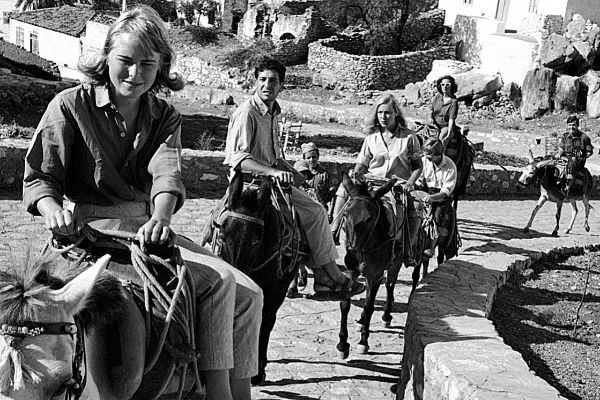About the love story between Marianne Ihlen and Leonard Cohen always flew over the idea of eternal damn romance. He quoted her at the concerts before singing So long Marianne ("I wrote this for Marianne. I hope she is here, maybe she is here," she whispered into the microphone) and before the Norwegian died, he wrote her an affectionate farewell letter ( "I will follow you very soon"). But who was Marianne Ihlen really? The documentary Marianne & Leonard: Words of Love , directed by Nick Broomfield and premiered at the In-Edit festival, deactivates the topic that always reduced it to muse and portrays the saddest and most cruel part of the idyll.
Marianne and Leonard met on the Greek island of Hydra, an idealized pilgrimage site for aspiring artists in the 60s where life was bohemian, cheap, simple and the acid ran to spurs. She fled from a violent husband and met there with her seven-year-old son , Axel. He also defined himself as a "refugee" fleeing from himself and everything in general, "even from the good." The first year they spent together was fruitful for Cohen: he wrote all day, almost always on speed ; she cooked, it was her "Greek muse." Marianne had never seen herself as a beautiful woman (she had a small breast complex) until Cohen made her feel beautiful, but soon she began to feel bad because she was the only one who did not write, paint or sculpt on the island. Beautiful losers was received unevenly (a critic called her "verbal masturbation") and Cohen understood that she had to change plans to succeed . He traveled to New York and debuted on stage with Judy Collins while Hydra was full of celebrities and drug use was unchecked ( even donkeys on the island were placed ), taking marriages and families ahead. The children, also Axel, were collateral victims of this false utopia of freedom and equality.
When Cohen's career took off, their relationship began to break apart. She followed him to Montreal and New York; he lived half the time in the Chelsea Hotel, where he met Janis Joplin. Cohen acknowledges that he greatly enjoyed the climate of sexual liberation of the 60s and 70s, his reputation as a womanizer is known. Marianne resigned herself and accepted the terms of a Guadiana relationship that grew cold. Jealousy, humiliation (Suzanne Elrod, the mother of Cohen's children, threw her out of Hydra's house), her low self-esteem and hard times, like when she aborted alone , made a dent in her instability: she was wandering aimlessly for years for Europe, tried to commit suicide and ended up committing Axel. He ended up returning to Oslo and getting married, although he never freed himself from being the eternal ex . Norwegian television interviewed her every time Cohen gave a concert and she had secured seats in the front row, from where she chanted the famous song about her breakup, in an eternal loop that relived her great love failure over and over again.
Eric Lerner met Leonard Cohen in a Zen retreat led by Joshu Sasaki Roshi. They were intimate four decades, they shared a house in Los Angeles to be close to Roshi, family vacations and long telephone talks that details in Matters of vital interest (Alliance), where he describes Cohen as a Jewish poet cult marked by the Holocaust, of simple customs (He loved to go to the kosher shop for chopped liver, pickles, fish pate and sauerkraut for dinner at home) who turned to music "to flirt", he used to say "jokingly."
Cohen was very aware that his participation in a new age religion could be "embarrassing," so it took 20 years for him to speak in public about Roshi, "and even then he did it in an elliptical way, despite the profound and lasting influence on his life ». When in 2012 another monk accused him of having "inappropriate" and "non-consensual" sex with students , Cohen said in the New Yorker that he had only been one of his teachers, "an influence among many others." The betrayal distanced them, although Cohen defrayed Roshi's medical expenses until the end and remained faithful by his bed at Cedars-Sinai when he became ill.
Lerner barely mentions Marianne, yes Suzanne ( "I was completely fascinated by the contemplation of her ass," Cohen confessed about her first meeting, at a meeting of Scientologists) and Dominique Issermann, "the only woman deeply self-confident with the one that Leonard was never ”, who refused to abandon his Parisian intellectual life for the singer. “ Leonard could have been a great rabbi, but he was a poet, not a teacher. The teacher wants to be followed by his teachings. The poet, meanwhile, creates a character »and Leonard, Lerner acknowledges,« was a character master ».
According to the criteria of The Trust Project
Know more- literature
- movie theater
Stories Santiago Lorenzo: "My only plan is that what I write is not a pain"
The final interview The screenwriter Susana López Rubio: "The Spanish series are now in a brutal moment"
The Sphere of PaperPola Olaixarac, Tarantino and the art of appropriation

